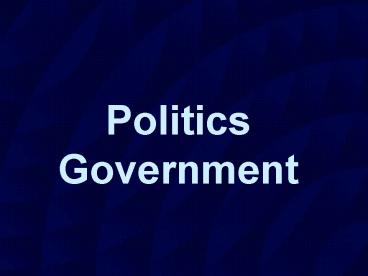Politics Government - PowerPoint PPT Presentation
1 / 14
Title:
Politics Government
Description:
Politics Government Polity If men were angels, there would be no need for government. James Madison The constitution was written by 1949 The constitution was ... – PowerPoint PPT presentation
Number of Views:236
Avg rating:3.0/5.0
Title: Politics Government
1
PoliticsGovernment
2
Polity
- If men were angels, there would be no need for
government. James Madison - The constitution was written by 1949
- The constitution was adopted in 1950
- India is a federal republic, a representative
democracy - Parliament is based on a bicameral system
3
(No Transcript)
4
Judicial system
5
House of Parliament Presidential Residence
- New Delhi
- Sansad Bhavan
- Rashtrapati Bhavan
6
Hierarchy of governments
7
Political Parties
Party Abbreviation General Secretary / President
Bharatiya Janata Party BJP Rajnath Singh
Indian National Congress INC Sonia Gandhi
Nationalist Congress Party NCP Sharad Pawar
Communist Party of India CPI Suravaram Sudhakar Reddy
Communist Party of India (Marxist) CPI(M) Prakash Karat
Bahujan Samaj Party BSP Mayawati
8
Leaders
- UPA chairperson
- INC president
- Sonia Gandhi
- and Prime Minister
- Manmohan Singh
- President
- Pranab Mukherjee
9
Rights
- Equality before the law.
- Freedom of speech.
- Freedom of association and peaceful assembly.
- Freedom of religion.
- Freedom of movement within the country.
- The right to live in India where a citizen
chooses and select the occupation he or she
desires. - Protection from discrimination on the basis of
religion, caste, sex, race, or place of birth. - The right not to be a witness against
himself/herself. - The abolishment of untouchability.
- The prohibition of forced labor or trafficking of
people.
10
Responsibilities
- To abide by the constitution and respect its
ideals and institutions, the national flag, and
the national anthem. - To cherish and follow the noble ideals that
inspired our national struggle for freedom. - To uphold and protect the sovereignty, unity, and
integrity of India. - To defend the country and render national service
when called upon to do so. - To promote harmony and the spirit of common
brotherhood amongst all the people of India
transcending religious, linguistic, and regional
or sectional diversities to renounce practices
derogatory to the dignity of women. - To value and preserve the rich heritage of our
composite culture. - To protect and improve the natural environment
including forests, lakes, rivers and wildlife,
and to have compassion for living creatures. - To develop the scientific temper, humanism, and
the spirit of inquiry and reform. - To safeguard public property and to abjure
(renounce) violence. - To strive toward excellence in all spheres of
individual and collective activity so that the
nation constantly rises to higher levels of
endeavor and achievement.
11
International Affairs
- Decolonization movement
- Non-alignment movement based on 5 principles
- 1. Mutual respect for each other's territorial
integrity and sovereignty - 2. Mutual non-aggression
- 3. Mutual non-interference in domestic affairs
- 4. Equality and mutual benefit
- 5. Peaceful co-existence
12
Territorial disputes
13
Territorial disputes
- Pakistan
- The unresolved Kashmir dispute and the status of
Kashmir with Pakistan, India claims the disputed
territories in Pakistan known as Azad
Kashmir and Gilgit Baltistan, while Pakistan
disputes India's administration of Jammu and
Kashmir. - Dispute over Sir Creek and the maritime
boundary regarding the Rann of Kachchh area of
India. - Water-sharing problems with Pakistan over the
Indus River (Wular Barrage). - Bangladesh
- 6.5 km of the border between India and Bangladesh
remains to be demarcated. - Ongoing discussions with Bangladesh to
exchange 162 minuscule enclaves between the two. - People's Republic of China
- India claims Aksai Chin and Trans-Karakoram
Tract, as part of Jammu and Kashmir. - China claims most of Arunachal Pradesh, a
contested disputed territory of north-east
India by not recognising the McMahon Line. - Nepal
- Kalapani village of India is claimed by Nepal and
Nawalparasi district of Nepal is claimed by
India. - Maldives
- Some in the Maldives claim that Minicoy Island is
Maldivian.
14
Peace































